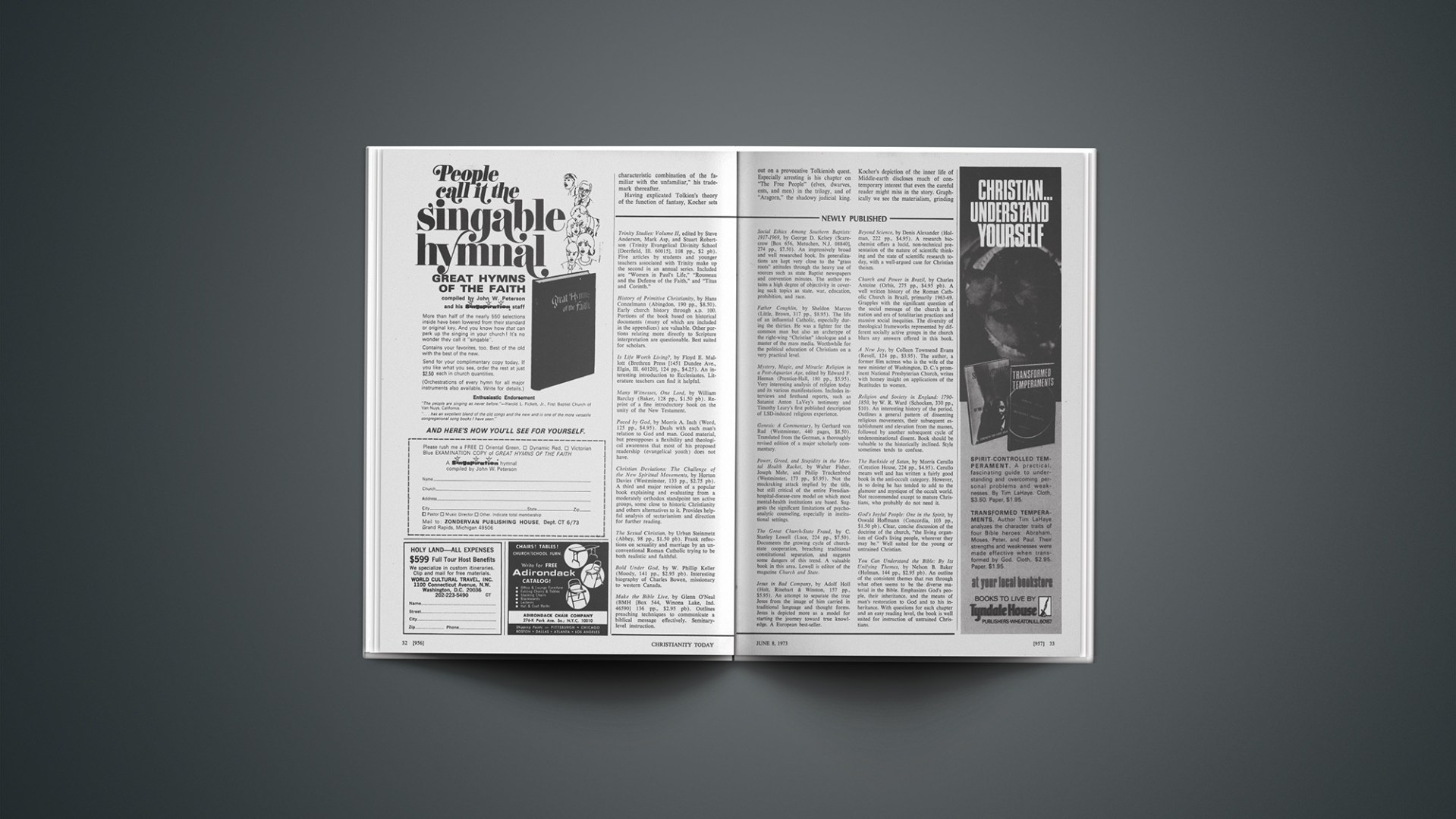The Dust of Death: A Critique of the Establishment and the Counter Culture—and a Proposal For a Third Way, by Os Guinness (Inter-Varsity, 1973, 419 pp., $4.95 pb), is reviewed by Harold O. J. Brown, associate editor, CHRISTIANITY TODAY.
At first glance Os Guinness seems to have provided the detailed data, facts, and footnotes necessary to undergird the radical and compelling analysis of modern culture initiated by Francis A. Schaeffer. Schaeffer’s first two books, Escape From Reason and The God Who Is There, are fascinating in their penetrating insight into the true meaning and deep sickness of modern Western, post-Reformation culture and life, but they do not present the reader with much hard evidence. As a result one may intuitively feel that Schaeffer is dead right in his diagnosis, and yet wonder whether this can be argued convincingly without firmer data and more detailed analysis than Schaeffer gives. Since Guinness’s book names names and provides footnotes in profusion, it seems intended to be the substantiating complement to Schaeffer’s brilliant insights.
In the first eight chapters of The Dust of Death, Schaeffer’s younger colleague charts the history and diagnoses the current state of the modern mentality, on occasion offering biblical Christian counter-proposals; in chapters nine and ten, he gives an intellectual apologetic for Christianity as a true and self-consistent teaching and then attempts to show the radical consequences of this conviction for life in today’s world. His style is generally felicitous and his choice of phrases arresting, only occasionally marred by poor editing or proofreading.
It is in the first eight chapters, in which he reviews Western intellectual history from Immanuel Kant (1724–1804) to the present, with an occasional glance back behind Kant, that Guinness is most impressive. The list of philosophers, novelists, and artists cited is virtually overwhelming, and indicates an amazing breadth of knowledge, particularly of the present and recent past. The most diverse figures, from analytical philosophers to organizers of “happenings,” throng his pages.
Unfortunately, the references are often so fragmentary—frequently little more than name-dropping—that if one is not rather familiar with the person cited, one cannot be sure one has gotten Guinness’s point, much less be confident that it is well taken. Writers of all persuasions are cited as equally authoritative, with no explanation of their presuppositions, no critical evaluation of their position, and no indication of whether the fragmentary quotations are truly representative of the author’s basic thought. Few readers can fail to be impressed with the encyclopedic sweep of Guinness’s work, but still fewer will possess the necessary familiarity with enough twentieth-century figures to understand him fully.
The Dust of Death incurs the same criticism as a number of other major efforts by intellectual evangelicals: it displays great familiarity with secular and apostate literature, but rather conceals its author’s debt to outstanding thinkers in the Reformation tradition. Guinness is clearly in the tradition of Dooyeweerd, Van Til, Schaeffer, and Rookmaaker, but only Dooyeweerd and Schaeffer are mentioned, and that quite briefly; the footnotes are almost exclusively to authorities with whom Guinness disagrees. Addressing himself to the counter-cultures and their devotees, Guinness does not try to integrate his own encyclopedic survey into the analysis and critique of unrecognized religious presuppositions urged, for example, by Dooyeweerd and Van Til; such an integration would complete the diagnosis he gives.
Chapter nine is a useful restatement of the distinctively propositional and authoritative character of biblical revelation as the wellspring of Christian belief; ten calls for a truly Christian radicalism or radical Christianity, one that will repudiate both the smugness of the Christianized status quo and the apostate utopianism of the political and counter-cultural revolutionaries. Readers inclined to conservatism in politics will feel that Guinness gets off some cheap shots at the favorite targets of the left intellectuals, notably the Viet Nam war and Richard Nixon.
As is so often the case with evangelicals (this reviewer included) who owe a debt to Schaeffer’s analysis of the contemporary mentality, Guinness is better at diagnosing than at suggesting a cure. He does indeed call for “constructive Christian radicalism,” but instead of a comprehensive program, he offers a mixture of pious generalizations and trivial illustrations: a solid foundation of detailed principles and concrete applications has yet to be laid.
Placed alongside the earlier works of Schaeffer and his circle, Guinness’s book, with its contemporaneity, its wealth of detail, and its broad scope, is a significant contribution, a broad and frequently penetrating analysis of the spirit of the age in the light of biblical teachings. We hope that in a subsequent work Guinness will more fully substantiate his massive critique and go into greater and more practical detail about applications for today.










